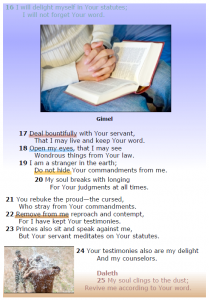 “Open my eyes, that I may see wondrous things from your law.” What a great and necessary prayer for us all! The truth is that it would be possible to memorize every verse of this psalm without being greatly enlightened by it, if the Spirit of God does not work in us to reveal the wonders of God’s truth. Without God’s help, we could turn into miners who shovel away vast riches of ore as if it were so much dirt.
“Open my eyes, that I may see wondrous things from your law.” What a great and necessary prayer for us all! The truth is that it would be possible to memorize every verse of this psalm without being greatly enlightened by it, if the Spirit of God does not work in us to reveal the wonders of God’s truth. Without God’s help, we could turn into miners who shovel away vast riches of ore as if it were so much dirt.
I have a particular affinity for verses 19. Having lived as a stranger in several cultures, I know the frustrations of not knowing how things are done, of feeling out of place, of being censured for breaking rules I didn’t know existed. To a certain extent, we all live with those feelings of an outsider; and only a thorough knowledge and application of God’s ways offers us sure footing.
The psalmist refers to himself as “your servant” (as in verses 17 and 23) thirteen times in the psalm. It’s an appropriate title for one who expresses in so many ways that his one desire is to “live and keep your word.”
As with the Beth section, the last verse is an expression of delight in God’s word.
The psalm is a prayer, so it’s not surprising that the two persons most mentioned in it are the psalmist himself and his God. After the three introductory verses, only forty verses of the psalm mention other people. Five of these references are positive (verses 63, 74, 79, 132, and 165), four are neutral (46, 99, 100, 130), and the overwhelming majority, as here in verses 22 and 24, are negative.
This is a personal rather than a corporate psalm; the psalmist is following God in the face of great adversity, and has decided to continue to do so regardless of the actions of others. He is a pilgrim who gladly welcomes the companionship of other pilgrims on the road–but who will continue the trek faithfully whether others join him or not.
Memorization notes
I’ve marked the psalmist’s four requests of God on the Gimel page layout.
Some tips specific to the New King James Version:
Some time over the next two years, when you’re reciting verse 17, you’ll stop and ask yourself, “Was that ‘that I might live’ or ‘so that I might live’?” You could, indeed, ask yourself a similar question about verse 18, or about many other verses that fit this pattern.
Answer; Only in verse 88 in the NKJV does “so that” occur. (Verse 88 also contains the only occurrence of “testimony” rather than “testimonies.”) In all other similar cases, it’s simply “that.”
You might also ask yourself, “Was it ‘that I may live’ or ‘that I might live’?”
Answer: In the NKJV, the word “might” only occurs in verse 11. Every other time, it’s “may.”
If you’re not memorizing in the NKJV, you might find it helpful to look for similar peculiarities of grammar or language in the version you’re using.
